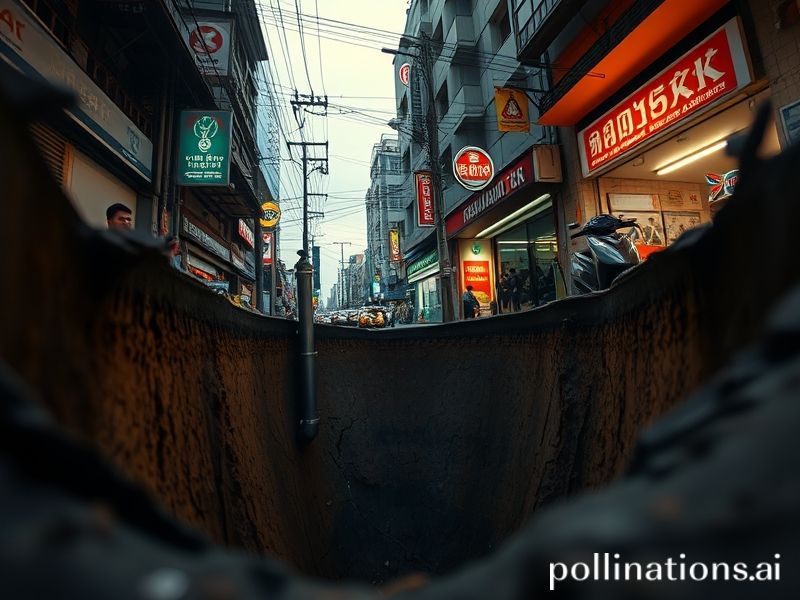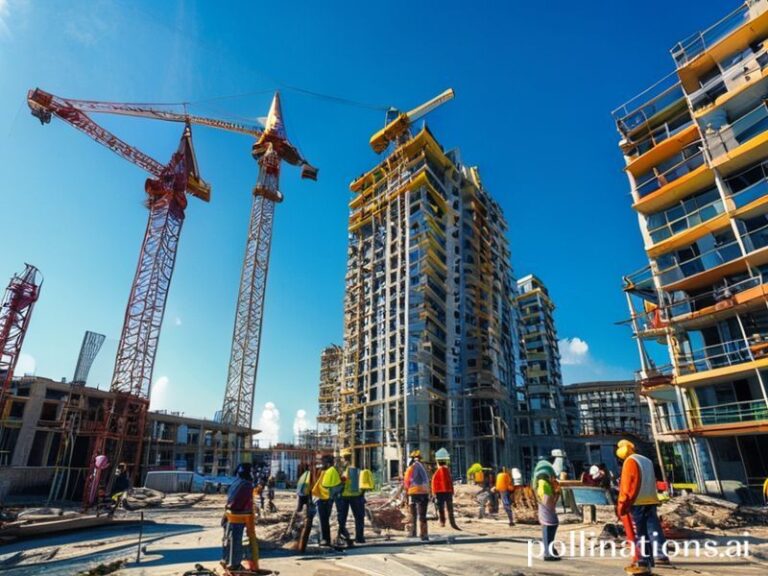Bangkok’s Latest Sinkhole: A Global Preview of Civilization’s Slow-Motion Dive
Bangkok Swallows Itself (Again): A Love Story Between a City and the Void
By our man in Southeast Asia—currently on the 7th floor and still sinking
BANGKOK — Early Tuesday, a modest chunk of Ratchaprasong intersection—normally a shrine to consumerism anchored by Hermès, Gucci, and a traffic light that no one obeys—performed the civic equivalent of a theatrical faint and vanished into a six-storey hole. One moment, motorcycles, street-food carts, and a particularly unfortunate pink taxi were humming along; the next, they were auditioning for Journey to the Center of the Earth. Miraculously, only one injury: a Grab driver with a dislocated shoulder and a newfound distrust of asphalt.
To locals, the incident was less “breaking news” and more “Tuesday.” Bangkok has been sinking roughly two centimetres a year—faster if you live above a clandestine water-pumping station run by the adjacent five-star hotel. By 2100, most of the Thai capital is projected to sit below sea level, a timeline that real-estate agents somehow translate into “coastal lifestyle opportunity.”
But let’s zoom out, dear reader, because a hole in Bangkok is never just a hole. It’s a geological wink at every coastal megacity that spent the last half-century replacing mangroves with malls. Jakarta is sinking faster than its presidential approval ratings. Venice now floods when a waiter sneezes. Lagos, Miami, Rotterdam—they’re all locked in the same slow-motion limbo dance with rising seas, wondering how low they can go before someone turns off the music.
The international implications are deliciously ironic. Thailand, the world’s second-largest rice exporter, may soon need to import arable land itself. Global supply chains—those immaculate arteries of just-in-time capitalism—thread through Bangkok’s port like gold through a tooth. Should the city decide to audition as the next Atlantis, your next iPhone could arrive slightly damp and smelling of fish sauce. Insurance giants, who once restricted actuarial panic to Californian wildfires and Floridian hurricanes, now add “subsidence risk in Southeast Asian capitals” to their nightly stress-dream rotation.
Meanwhile, the diplomatic corps is practicing its synchronized eyebrow raise. Climate summits keep producing communiqués thicker than a Bangkok phonebook (remember those?), yet none have figured out how to sanction a city block for criminal negligence against its own foundation. The United Nations, ever the master of constructive ambiguity, recently upgraded Bangkok’s risk level from “vulnerable” to “yikes,” prompting a run on stilts at the local hardware store.
Back on the ground, Thailand’s junta-turned-government—now wearing democratic cosplay—has pledged a 120-billion-baht “super dyke” project. Think of it as a gated community for the entire metropolis, only the moat is on both sides and the gate is made of press conferences. Environmental scientists calculate the barrier will buy the city approximately 30 years, or one complete fashion cycle in which culottes make their inevitable comeback.
Human nature, ever the reliable punchline, is responding exactly as you’d expect. Luxury condominiums near the new waterfront (formerly Sukhumvit) are marketing “exclusive marina views.” A crypto startup is offering NFTs of the sinkhole, divided into virtual plots you can brag about on Discord while your actual living room acquires mildew. And somewhere in Silicon Valley, a Stanford dropout is pitching venture capitalists on “disruptive buoyancy pods”—essentially houseboats with Wi-Fi and a subscription meal kit.
The prognosis, in case you’re still clinging to optimism, is equal parts engineering marvel and slow-motion horror film. Bangkok will spend billions pumping, elevating, and rebranding itself until the day the pumps give up or the marketing budget runs dry—whichever comes first. In the interim, the rest of the planet gets a sneak preview of how civilizations politely decline: not with a bang, but with a gentle glug-glug and a 30-second TikTok of the last traffic light blinking underwater.
So if you’re booking that post-pandemic foodie tour, perhaps pack galoshes and a philosophical disposition. The sinkhole isn’t a disaster; it’s just Bangkok’s way of curtsy-bowing to the inevitable—while reminding the rest of us that, eventually, every city becomes waterfront property if you wait long enough.







